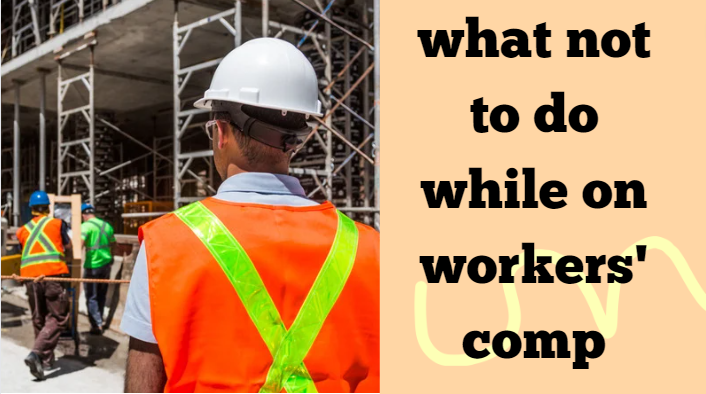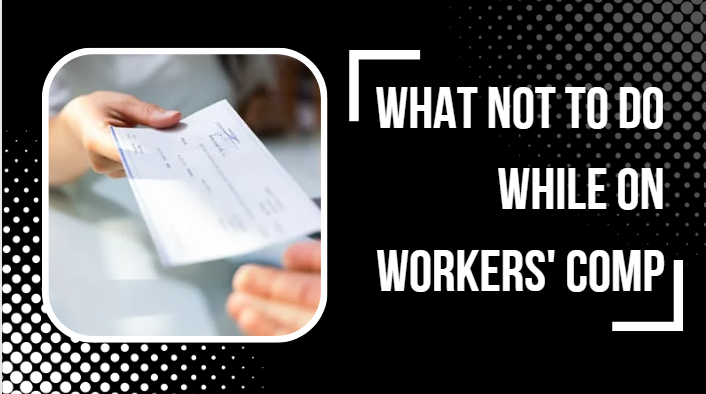what not to do while on workers’ comp
While seeking or getting workers’ comp benefits, you must act with integrity and be honest and informed about the entire process.
You may be denied benefits if you contravene the rules or do not undertake the process in a timely and efficient manner.
Here is a list of things you shouldn’t do to receive your compensation claims successfully.

What not to do while on workers’ comp
Here are some things not to do while on worker’s compensation:
- not reporting your work injury to your manager or employer on time
- not adequately describing the nature of your injury to your compensation doctor,
- pretending or lying about injuries or symptoms.
- disobeying your doctor’s treatment plan.
- disregarding your doctor’s advice or recommendation.
- not getting back to work when approved or given the go-ahead by your doctor.
Please note that each worker does not have the same compensation claim.
Thus, it is important to use your discretion while deciding matters relating to your claim.
Also, for a swift and healthy recovery, it is important to comply with your doctor’s advice.
For inquiries and complaints about the process or what not to do while seeking workers’ compensation, ensure you contact a professional workers’ compensation lawyer.
Receiving the compensation you are entitled to shouldn’t be difficult. All you have to do is inform your employer, visit an authorized health practitioner and submit a claim.
However, if things take another turn, your insurance agency may not approve your claim. When you get injured in your workplace, you might get confused about the process. This is why we put together the frequently asked questions below:
FAQ
When Do Workers’ Comp Investigators Follow You?
Whenever you submit a claim, the worker comp investigator might review or follow you. You may be subject to review if your claim is large or if you have previously submitted a claim, or if the insurance agency has suspicions of fraud.
How long can you receive workers’ compensation?
The length of time you can receive temporary worker’s comp depends on your place of residence or the jurisdiction of your workplace. It can vary from 3 to 8 years. However, for permanent benefits, there isn’t any time limit. Some states cease to provide weekly benefits when employees turn 65 years of age.
How long do the majority of workers’ compensation settlements take?
Roughly 16 months
Workers’ compensation settlements can happen soon after a workplace accident (in a matter of weeks or months), or they can go on for years. On average, a worker’s comp case takes sixteen months to be settled. This could lead to a compensation agreement or court proceedings.
What are the benefits of workers’ compensation?
- compensation for income loss;
- healthcare equipment, consumables, and services;
- caregivers’ compensation;
- counseling services;
- Death benefits;
- Funeral benefits.
What is worker compensation, and how does it work?
Workers’ compensation is coverage that offers cash assistance and/or medical services for employees who are injured or become sick directly as a result of their job. This coverage is paid for by the employer; the worker is not expected to contribute to this kind of compensation.
What are the 3 kinds of compensation?
There are three kinds of compensation that are provided to an employee. They are intangible, direct and indirect compensation.
What are the leading causes of workers’ compensation?
Here are among the leading causes of injury and workers comp, based on EMPLOYERS® claim data:
- Lacerations.
- Sprains and strains.
- Contusions. …
- Burns. …
- Eye Injuries. …
- Fractures. …
- Cumulative or Continuous Trauma.
What is the objective of compensation?
The purpose of compensation is to provide an attractive payout to employees in order to encourage them to stay working at a particular business or company and be committed to attaining that organization’s goals
What are the four major employee benefits?
The most popular types of employee benefits provided today are:
- Medical insurance.
- Life insurance.
- Disability insurance.
- Retirement contributions and pension plans.
What are the five principles that worker compensation is built on?
The Meredith principles (no-fault compensation, collective liability, security of payment, exclusive jurisdiction and administration by independent boards). This is the principle that established the foundation for workers’ compensation systems in Canada and the United States and largely remains so today.
Which profession has the largest worker comp claims?
- Construction. Construction workers are among the most hazardous jobs in America.
- Manufacturing. Similar to construction, manufacturing is a hazardous industry. …
- Healthcare. …
- Warehousing and transportation.
- Retail. …
- Agriculture, Fisheries, and Forest management.
Who is in charge or makes decisions for compensation?
HR professionals are often in charge of handling compensation, making sure that wages and bonuses are attractive and that benefits are tailored to suit the ever-evolving needs of the workers.
Also:
